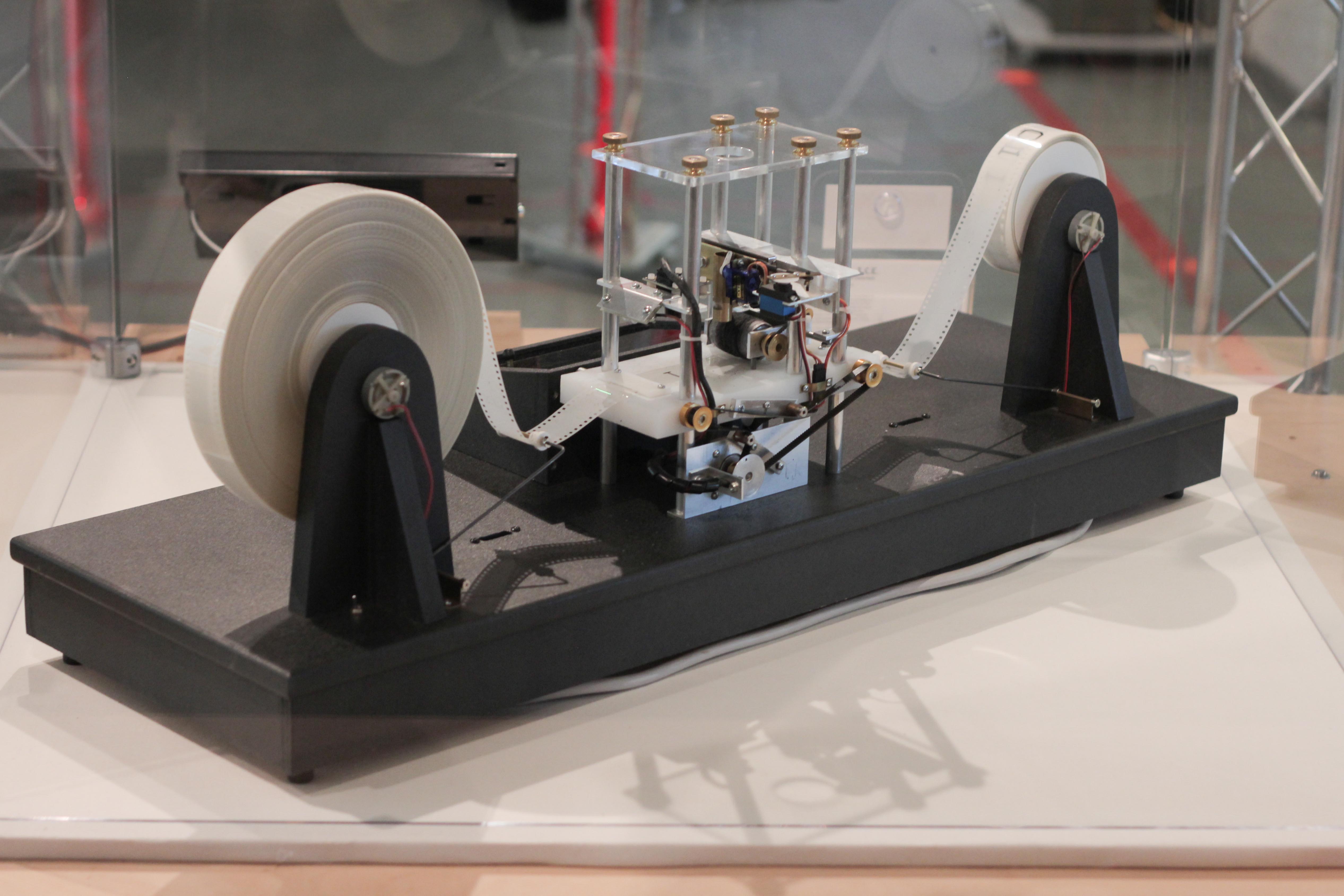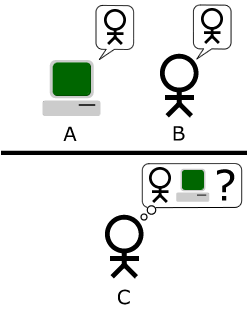|
Minds, Machines And Gödel
"Minds, Machines and Gödel" is J. R. Lucas's 1959 philosophical paper in which he argues that a human mathematician cannot be accurately represented by an algorithmic automaton. Appealing to Gödel's incompleteness theorem, he argues that for any such automaton, there would be some mathematical formula which it could not prove, but which the human mathematician could both see, and show, to be true. The paper is a Gödelian argument against mechanism. Lucas presented the paper in 1959 to the Oxford Philosophical Society. It was first printed in ''Philosophy'', XXXVI, 1961, then reprinted in ''The Modeling of Mind'', Kenneth M. Sayre and Frederick J. Crosson, eds., Notre Dame Press, 1963, and in ''Minds and Machines'', ed. Alan Ross Anderson, Prentice-Hall, 1964, . See also *Artificial intelligence *Philosophy of artificial intelligence The philosophy of artificial intelligence is a branch of the philosophy of technology that explores artificial intelligence and its implica ... [...More Info...] [...Related Items...] OR: [Wikipedia] [Google] [Baidu] |
John Lucas (philosopher)
John Randolph Lucas (18 June 1929 – 5 April 2020) was a British philosopher. Biography Lucas was educated at Winchester College and then, as a pupil of R.M. Hare, among others, at Balliol College, Oxford. He studied first mathematics, then Greats (Greek, Latin, Philosophy and Ancient History), obtaining first class honours in both. He sat for Finals in 1951, and took his MA in 1954. He spent the 1957–58 academic year at Princeton University, studying mathematics and logic. For 36 years, until his 1996 retirement, he was a Fellow and Tutor of Merton College, Oxford, and he remained an emeritus member of the University Faculty of Philosophy. He was a Fellow of the British Academy. Lucas is perhaps best known for his paper "Minds, Machines and Gödel," arguing that an automaton cannot represent a human mathematician, attempting to refute computationalism. An author with diverse teaching and research interests, Lucas wrote on the philosophy of mathematics, especially the ... [...More Info...] [...Related Items...] OR: [Wikipedia] [Google] [Baidu] |
Mathematician
A mathematician is someone who uses an extensive knowledge of mathematics in their work, typically to solve mathematical problems. Mathematicians are concerned with numbers, data, quantity, structure, space, models, and change. History One of the earliest known mathematicians were Thales of Miletus (c. 624–c.546 BC); he has been hailed as the first true mathematician and the first known individual to whom a mathematical discovery has been attributed. He is credited with the first use of deductive reasoning applied to geometry, by deriving four corollaries to Thales' Theorem. The number of known mathematicians grew when Pythagoras of Samos (c. 582–c. 507 BC) established the Pythagorean School, whose doctrine it was that mathematics ruled the universe and whose motto was "All is number". It was the Pythagoreans who coined the term "mathematics", and with whom the study of mathematics for its own sake begins. The first woman mathematician recorded by history was Hypati ... [...More Info...] [...Related Items...] OR: [Wikipedia] [Google] [Baidu] |
Turing Machine
A Turing machine is a mathematical model of computation describing an abstract machine that manipulates symbols on a strip of tape according to a table of rules. Despite the model's simplicity, it is capable of implementing any computer algorithm. The machine operates on an infinite memory tape divided into discrete cells, each of which can hold a single symbol drawn from a finite set of symbols called the alphabet of the machine. It has a "head" that, at any point in the machine's operation, is positioned over one of these cells, and a "state" selected from a finite set of states. At each step of its operation, the head reads the symbol in its cell. Then, based on the symbol and the machine's own present state, the machine writes a symbol into the same cell, and moves the head one step to the left or the right, or halts the computation. The choice of which replacement symbol to write and which direction to move is based on a finite table that specifies what to do for each comb ... [...More Info...] [...Related Items...] OR: [Wikipedia] [Google] [Baidu] |
Gödelian Argument
Mechanism is the belief that natural wholes (principally living things) are similar to complicated machines or artifacts, composed of parts lacking any intrinsic relationship to each other. The doctrine of mechanism in philosophy comes in two different flavors. They are both doctrines of metaphysics, but they are different in scope and ambitions: the first is a global doctrine about nature; the second is a local doctrine about humans and their minds, which is hotly contested. For clarity, we might distinguish these two doctrines as universal mechanism and anthropic mechanism. Universal mechanism The older doctrine, here called universal mechanism, is the ancient philosophies closely linked with materialism and reductionism, especially that of the atomists and to a large extent, stoic physics. They held that the universe is reducible to completely mechanical principles—that is, the motion and collision of matter. Later mechanists believed the achievements of the scientifi ... [...More Info...] [...Related Items...] OR: [Wikipedia] [Google] [Baidu] |
Mechanism (philosophy)
Mechanism is the belief that natural wholes (principally living things) are similar to complicated machines or artifacts, composed of parts lacking any intrinsic relationship to each other. The doctrine of mechanism in philosophy comes in two different flavors. They are both doctrines of metaphysics, but they are different in scope and ambitions: the first is a global doctrine about nature; the second is a local doctrine about humans and their minds, which is hotly contested. For clarity, we might distinguish these two doctrines as universal mechanism and anthropic mechanism. Universal mechanism The older doctrine, here called universal mechanism, is the ancient philosophies closely linked with materialism and reductionism, especially that of the atomists and to a large extent, stoic physics. They held that the universe is reducible to completely mechanical principles—that is, the motion and collision of matter. Later mechanists believed the achievements of the scientif ... [...More Info...] [...Related Items...] OR: [Wikipedia] [Google] [Baidu] |
Oxford Philosophical Society
Oxford () is a city in England. It is the county town and only city of Oxfordshire. In 2020, its population was estimated at 151,584. It is north-west of London, south-east of Birmingham and north-east of Bristol. The city is home to the University of Oxford, the oldest university in the English-speaking world; it has buildings in every style of English architecture since late Anglo-Saxon. Oxford's industries include motor manufacturing, education, publishing, information technology and science. History The history of Oxford in England dates back to its original settlement in the Saxon period. Originally of strategic significance due to its controlling location on the upper reaches of the River Thames at its junction with the River Cherwell, the town grew in national importance during the early Norman period, and in the late 12th century became home to the fledgling University of Oxford. The city was besieged during The Anarchy in 1142. The university rose to dominat ... [...More Info...] [...Related Items...] OR: [Wikipedia] [Google] [Baidu] |
Kenneth M
Kenneth is an English given name and surname. The name is an Anglicised form of two entirely different Gaelic personal names: ''Cainnech'' and '' Cináed''. The modern Gaelic form of ''Cainnech'' is ''Coinneach''; the name was derived from a byname meaning "handsome", "comely". A short form of ''Kenneth'' is '' Ken''. Etymology The second part of the name ''Cinaed'' is derived either from the Celtic ''*aidhu'', meaning "fire", or else Brittonic ''jʉ:ð'' meaning "lord". People :''(see also Ken (name) and Kenny)'' Places In the United States: * Kenneth, Indiana * Kenneth, Minnesota * Kenneth City, Florida In Scotland: * Inch Kenneth, an island off the west coast of the Isle of Mull Other * "What's the Frequency, Kenneth?", a song by R.E.M. * Hurricane Kenneth * Cyclone Kenneth Intense Tropical Cyclone Kenneth was the strongest tropical cyclone to make landfall in Mozambique since modern records began. The cyclone also caused significant damage in the Comoro Islands an ... [...More Info...] [...Related Items...] OR: [Wikipedia] [Google] [Baidu] |
Artificial Intelligence
Artificial intelligence (AI) is intelligence—perceiving, synthesizing, and inferring information—demonstrated by machines, as opposed to intelligence displayed by animals and humans. Example tasks in which this is done include speech recognition, computer vision, translation between (natural) languages, as well as other mappings of inputs. The ''Oxford English Dictionary'' of Oxford University Press defines artificial intelligence as: the theory and development of computer systems able to perform tasks that normally require human intelligence, such as visual perception, speech recognition, decision-making, and translation between languages. AI applications include advanced web search engines (e.g., Google), recommendation systems (used by YouTube, Amazon and Netflix), understanding human speech (such as Siri and Alexa), self-driving cars (e.g., Tesla), automated decision-making and competing at the highest level in strategic game systems (such as chess and Go). ... [...More Info...] [...Related Items...] OR: [Wikipedia] [Google] [Baidu] |
Philosophy Of Artificial Intelligence
The philosophy of artificial intelligence is a branch of the philosophy of technology that explores artificial intelligence and its implications for knowledge and understanding of intelligence, ethics, consciousness, epistemology, and free will. Furthermore, the technology is concerned with the creation of artificial animals or artificial people (or, at least, artificial creatures; see artificial life) so the discipline is of considerable interest to philosophers. These factors contributed to the emergence of the philosophy of artificial intelligence. Some scholars argue that the AI community's dismissal of philosophy is detrimental. The philosophy of artificial intelligence attempts to answer such questions as follows: * Can a machine act intelligently? Can it solve ''any'' problem that a person would solve by thinking? * Are human intelligence and machine intelligence the same? Is the human brain essentially a computer? * Can a machine have a mind, mental states, and consciou ... [...More Info...] [...Related Items...] OR: [Wikipedia] [Google] [Baidu] |
Philosophy Essays
Philosophy (from , ) is the systematized study of general and fundamental questions, such as those about existence, reason, knowledge, values, mind, and language. Such questions are often posed as problems to be studied or resolved. Some sources claim the term was coined by Pythagoras ( BCE), although this theory is disputed by some. Philosophical methods include questioning, critical discussion, rational argument, and systematic presentation. in . Historically, ''philosophy'' encompassed all bodies of knowledge and a practitioner was known as a ''philosopher''."The English word "philosophy" is first attested to , meaning "knowledge, body of knowledge." "natural philosophy," which began as a discipline in ancient India and Ancient Greece, encompasses astronomy, medicine, and physics. For example, Newton's 1687 ''Mathematical Principles of Natural Philosophy'' later became classified as a book of physics. In the 19th century, the growth of modern research universitie ... [...More Info...] [...Related Items...] OR: [Wikipedia] [Google] [Baidu] |
1959 Essays
Events January * January 1 - Cuba: Fulgencio Batista flees Havana when the forces of Fidel Castro advance. * January 2 - Lunar probe Luna 1 was the first man-made object to attain escape velocity from Earth. It reached the vicinity of Earth's Moon, and was also the first spacecraft to be placed in heliocentric orbit. * January 3 ** The three southernmost atolls of the Maldive Islands, Maldive archipelago (Addu Atoll, Huvadhu Atoll and Fuvahmulah island) United Suvadive Republic, declare independence. ** Alaska is admitted as the 49th U.S. state. * January 4 ** In Cuba, rebel troops led by Che Guevara and Camilo Cienfuegos enter the city of Havana. ** Léopoldville riots: At least 49 people are killed during clashes between the police and participants of a meeting of the ABAKO Party in Kinshasa, Léopoldville in the Belgian Congo. * January 6 ** Fidel Castro arrives in Havana. ** The International Maritime Organization is inaugurated. * January 7 – The United States reco ... [...More Info...] [...Related Items...] OR: [Wikipedia] [Google] [Baidu] |





